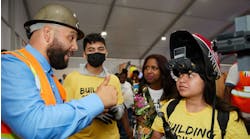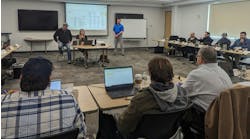ARODA, VIRGINIA — The P-H-C industry is lucky that Laurie Crigler is no longer teaching kindergarten. We probably have Daniel Crigler to thanks for that. Laurie Crigler holds a Masters Degree in early childhood education from the University of Virginia, and she intended to only help out Daniel a little bit by typing contracts and invoices (on an actual typewriter) in the evenings at newly formed L&D Associates Inc.
As the company grew and they added employees, Crigler knew she had to decide between teaching and contracting and chose contracting. “Best decision ever,” she said.
Crigler takes over as the new national president of Plumbing-Heating-Cooling Contractors – National Association at the group’s CONNECT 2017 conference and show in Milwaukee in early October.
The company has been involved in PHCC since the firm’s founding in 1983, and Crigler became active in order to learn as much as possible about the industry when she became her husband’s business partner. Crigler became politically active and has been a stalwart at the association’s annual Legislative Conference.
“Mostly we decided to become active in PHCC because you have to,” Crigler said. “In order to glean anything out of an organization, you have to be actively involved to derive the benefits that organization has to offer. We have learned so much from being active in PHCC and we have met the most wonderful people in the world through this organization…how could you not be involved!”
The most critical issue facing the industry today is the workforce crisis, Crigler said, not surprisingly because that’s what we hear from every contractor.
CONTRACTOR: Tell us about your first job.
Laurie Crigler: My very first paying job was as a waitress, at age 16, in the Friendly’s organization. I learned a lot about dealing with the public, efficiency and customer persuasion. I also learned about hard work and the fact that when I was scheduled, I was expected there (regardless of the fun teenage things that inevitably popped up). I couldn’t just decide to skip work … I had a job to do and others depended on me being there.
C: What was the most important thing you learned from you first boss?
L.C.: The most important thing I learned from my first boss was the concept of being a team player and that each player on the team was important. We did not function as individuals and we helped each other out. No one job was more important than another.
C: How did you meet Daniel Crigler?
L.C.: After I graduated from Mary Washington College, I moved in with a friend from school in Charlottesville, Virginia. I did not look for a job in my chosen field (I had a B.A. in Sociology with a specialty in Social Work) as I was finished with school and just wanted any job that would pay my bills. I went to work for the Leggett Department Store (now Belk’s) and eventually became a department head and buyer for that department. I was always striving for more training in whatever job I had. Daniel and his friends used to frequent a restaurant that my roommate and I went to often. I learned that he was a plumber, ran a large plumbing and heating company branch in Charlottesville, loved talking about the construction projects he and his friends were working on and we “clicked”. The things we talked about were so foreign to me and I found it fascinating. I spent four years dating him, trying several other jobs myself (including social work and teaching Kindergarten) and visited many of his jobsites before we eventually got married. He knew so much about the construction world and was so excited about the work that he and his crews were doing that it was infectious.
C: When did you know you wanted to get into the plumbing industry and start your own company?
L.C.: While I was teaching Kindergarten, my husband decided to leave the branch company he was running and open his own business. I did not initially intend to go into business with him but rather “help” him out in the office by typing (on an actual typewriter, no less) contracts and invoices in the evenings. He was so well known in the Charlottesville area, and had such a good reputation, that jobs were coming our way frequently. We were very fortunate that several builders he worked with in the branch company wanted only Daniel Crigler to do their work, so we did not have to work too hard to get jobs in the beginning. As the years went on, we added a couple of employees and getting my work done in the evening was more and more difficult. I made the decision to leave teaching and go to work full time with him and begin to really build our company. Best decision ever.
C: After all of your years of experience in the industry, what are two or three of the most important things you have learned?
L.C.: One the most important things I have learned is how varied this industry is. I am not a technical person but much of what I DO know I have been able to apply to our industry. I have helped design curricula for apprenticeship schools. I put together the insurance and health benefits packages for our company. I have learned how to read blueprints and helped with the permitting and licensing processes in several states in which we work and I have gotten heavily involved in the legislative/regulatory end of our industry. There is so much that I can and have done and yet I am not the technical person in the field. The second most important thing I have learned is how incredibly smart the plumbing and HVAC contractors are. I have been in rooms of contractors and listened to them discuss their various trades, issues and solutions to those issues and it truly amazes me how smart, technical and knowledgeable they are. The average person could not follow many of the discussions that I have listened in on and it amazes me that contracting and the trades are not elevated to the level of doctors and lawyers.
C: What’s the most difficult aspect of running a contracting business?
L.C.: It is always the people. The employees, the staff and the customers…there are so many personalities and trying to maintain a healthy balance in relationships while providing the right services and/or benefits at the right price without upsetting that balance is like walking a tightwire. If one is off, the entire company suffers.
C: What do you like most about your job?
L.C.: Without a doubt, the flexibility it offers and the fact that each day is a different. It never gets boring and each day offers a new set of challenges.
C: Why doesn’t L&D Associates Inc. have a website?
L.C.: As I said earlier, when we started this business, Daniel had such a stellar reputation in the plumbing industry that we never had to advertise (and still have never advertised). Since we don’t specialize in service work, and 90% of our work is done under contract with builders, we never felt the need to advertise in any form of media. As the world has become more technical, we have thought that having a website would be nice to let people know what our company does but we have not followed through on it.
C: Why did you decide to become active in PHCC?
L.C.: Our company became active in PHCC when we opened our business in 1983. We believe that belonging to an industry organization helps to mitigate problems that you are bound to encounter as you begin to grow your business and there is no point in reinventing the wheel if someone else has already found a solution to that same problem. We also needed a place to network with others in the same or similar industries and we found that home at PHCC.
I personally became active with PHCC because I wanted to learn more about our industry as I became my husband’s business partner and I wanted to see where my areas of expertise could help our business and our industry. That is when I became heavily involved in the legislative and regulatory arena.
But mostly we decided to become active in PHCC because you have to. In order to glean anything out of an organization, you have to be actively involved to derive the benefits that organization has to offer. We have learned so much from being active in PHCC and we have met the most wonderful people in the world through this organization…how could you not be involved!
C: What knowledge and insights about the industry do you want to pass along to your son?
L.C.: Our son, Danny, has been with us almost since day one. He had risen through the ranks from helper, to apprentice to journeyman to master under his dad’s tutelage. He has watched me get involved with the industry from a totally different angle and I think he has it ingrained in him that being part of this industry is challenging and wonderful. Being part of this association has provided us, and now him, with opportunities to lend his talents to giving back to the industry through his volunteer work with our state plumbing competition, SKILLS USA and the National Apprenticeship Contest. But I think the most important thing we hope we have passed on to him is that this is a career. It is not “just a job”. It is a career and as a business owner, you owe it to the employees who work with you to provide them with a great livelihood and an opportunity to grow their own families and live a comfortable life. To do that, you have to work hard beside them.
C: What is your biggest problem as a contractor? What do you see as being the biggest problem for PHCC members in general?
L.C.: My problem is the same as every other plumbing & HVAC contractor — the workforce/labor shortage. We have a lot of work and not enough people to do it. It is very stressful. There is a huge labor shortage of qualified plumbing and HVAC tradesmen and with the building industry booming now and the continued emphasis on improving our country’s infrastructure (which includes underground piping and old, crumbling waterways) we need 138,000 new technicians in the next few years just to keep up. The workforce/labor shortage is the biggest problem for PHCC members in general.
C: What can PHCC do to help solve those problems?
L.C.: PHCC’s strategic plan incorporates a plethora of goals regarding workforce development. PHCC has developed many collaterals ranging from videos, to pamphlets, to advertising campaigns, to banners all of which can be used by our local and state associations to help when doing career nights at high schools, to run their own advertising campaigns about our professions, or to get in the hands of guidance counselors in schools to aid our young people in making choices about their careers.
Several states have rolled out “Ride and Decide” programs which offers to take a young person along for a “day in the life of a plumbing or HVAC contractor”. This gives them a taste of the actual daily experiences. Other states have built career websites to help those looking for jobs find out about the plumbing and HVAC careers and how to get in touch with our state associations to find out more.
And of course, we are trying to target messages to differing groups (not just the young people, but guidance counselors and parents as well) alerting them to the fact that college is one avenue of education but apprenticeship is another very viable avenue of post high school education. There are great careers offered through the plumbing and HVAC professions that are technical, varied, well paying and challenging.
C: Is the workforce crisis primarily a problem of money or is there something else?
L.C.: The workforce crisis is not about money at all….it is about perception. Somewhere over the years, our country has gotten the message that if you don’t have a college education you are not a worthwhile person.
I think the country has forgotten that it was built on the backs of small businesses and many of those businesses are plumbing and HVAC companies. The services that these companies provide will always be needed, will provide a great living for our young people and they are becoming more and more technical. The country is so focused on “saving” all our valuable resources, as we should be, and plumbing/HVAC companies are in the throes of that efficiency push.
But while the public wants more efficient products, the repair and replacement of our aging infrastructure, great service for installation and quality work out of our plumbing/HVAC technicians, they don’t want their children going into the very fields that provide those services because they want them to go to college.
Training and apprenticeship education is needed to be in those fields but is far less costly than a four-year college education. We need to turn the public perception around so our young people have another avenue of education that provides them with careers that are respected in the community.
C: What do we need to change about the way middle and high schools talk about the trades?
L.C.: They need to talk about the trades! They don’t talk about them at all because of the push to send them to college. I would be very surprised if there is ever any mention of apprenticeship/trades education at any of the middle or high schools in this country. The young people and their parents are not being given the information to be able to make that choice.
There are so many creative ways that schools could keep their students interested in education if they expanded the curricula to include trades options. I think as the cost of a college education gets more and more expensive, and as we get better at delivering our message, parents will begin looking at alternatives for their children. We are on the cusp of getting them to realize that these careers are technical, admirable and financially rewarding.
My pipe dream, so to speak, is that the plumbing and HVAC are as respected in the community as the medical and legal professions. We are making strides in showing the country that these are not only needed professions, but desired professions. I would like to see our young people excited about going into one of these trades and I would like their parents to be proud of them choosing these professions.
C: What else have we not talked about that you want to mention?
L.C.: I think you can see from our conversation that focusing on workforce development is a key part of my PHCC presidency. I really would like to emphasize that the plumbing (and HVAC) industry has provided me and my family, and now the families of our employees with a wonderful, successful, productive life. Our employees have grown up with us. We have watched them start their careers, get their Journeyman licenses, get married, build houses, have their own families, travel and become productive, happy members of our society and isn’t that what we all want for our children? These industries are fascinating, varied, well paying and challenging and there are so many reasons to get into them…come join these industries, get active in PHCC and you won’t be disappointed.


